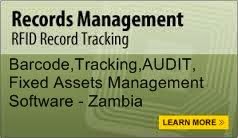Prosperity Agencies understands the need to achieve accurate Tracking of Assets. The primary purpose of physical inventory in asset management is
"To establish a current, accurate baseline of existing capital assets, accurate insurance payments, depreciation schedules, tax, compliance reporting and a host of other financial considerations.”
In order to provide legal compliance, safety assurance and the effective management of fixed assets, every business must know “What assets they currently have, where those assets are located and how those assets are changing over time.”
The company celebrates the fact that its asset tracking services using RFID label tags and associated asset tracking technologies will serve Zambian Businesses millions of dollars a year and play a very critical role in addressing these asset management requirements.
Just look at the transport sector, with the cost of tyres exceeding millions of Kwachas, large fleets of buses and trucks in Zambia spend many millions of dollars on tyres alone. To most consumers, one tyre is virtually indistinguishable from another, save for the manufacturers name on the side wall as a result; expensive tyres easily get stolen or replaced with old ones when the vehicle is on a trip or even within the parking yard.
Inventory tracking is chaos, but today, technology has closed that gap, and industries from cattle ranching to asset tracking to fleet owners eager to track their fleet tyres have already put it into use-Radio Frequency Identification or RFID.
Through the use of simple asset tracking technologies available today fleets can dramatically solve even the most challenging inventory tracking tasks and decrease tyre-spending resulting in large cost reduction, increase vehicle and driver safety, slow down the depletion of natural resources and decrease pollution, all from a single effort - professional asset management.
RFID tags embedded in a tyre or a barcode tag affixed to the side wall can be a very powerful tyre tracking tool. It will deter theft and help minimize tyre substitution.
The era of hand writing on assets and using spreadsheets to control assets, is over for complex, asset intensive business units in Zambia. It is vital that companies begin using auto identification technology based on barcode and RFID technology to extract value, and to extend the useful and safe life of assets today, tomorrow and in future.
However, it’s believed that most companies in Zambia are at least many years away from deploying similar asset tracking systems in their asset management programs.
About Prosperity Agencies
Prosperity Agencies provides comprehensive Asset Tagging and Verification services, the objective of which is to help organizations create accurate and verified records of capital assets with significantly more details than the existing financial systems are able to provide. Since 2010, a major focus of the company’s development is the provision of asset tracking solutions based on Barcode and RFID technology supplying tags, on site tagging and data collection and asset management systems implementation.
Prosperity Agencies is ready to actively cooperate for the development of the asset tracking market in Zambia and implementation of new and interesting asset tracking ideas, participate in joint asset management projects with Zambian asset management system integrators.





